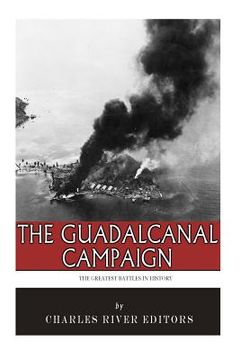Reseña del libro "The Greatest Battles in History: The Guadalcanal Campaign (en Inglés)"
*Includes pictures *Includes accounts of the fighting *Includes a bibliography for further reading "You ran a fever of 106 degrees. And you still had to try to stay, and stay with your position. You had dengue fever, which is even worse than malaria. Men that were scratched with coral became infected with a rundown condition. It was a war of attrition, mostly, for the Marines." - Major Vincent Kramer, 5th Defense Battalion, US Marines The names of history's most famous battles still ring in our ears today, with their influence immediately understood by all. Marathon lent its name to the world's most famous race, but it also preserved Western civilization during the First Persian War. Saratoga, won by one of the colonists' most renowned war heroes before he became his nation's most vile traitor. Hastings ensured the Normans' success in England and changed the course of British history. Waterloo, which marked the reshaping of the European continent and Napoleon's doom, has now become part of the English lexicon. In Charles River Editors' Greatest Battles in History series, readers can get caught up to speed on history's greatest battles in the time it takes to finish a commute, while learning interesting facts long forgotten or never known. The Guadalcanal Campaign, which ran from August 1942 to February 1943, was a bitter and protracted struggle that also happened to be a strange and transitional confrontation quite unlike any other in the long Pacific War. In conjunction with the American victory at the Battle of Midway, Guadalcanal represented the crucial moment when the balance of power in the Pacific tipped in favor of the Allies, but the idea that Guadalcanal would be such a significant battle would have come as a surprise to military strategists and planners on both sides. Nonetheless, by the time the Guadalcanal campaign was underway, it was a confrontation that neither side actively sought, but that both sides came to believe they could not afford to lose. When Allied forces landed on the island, it was an effort to deny the Japanese the use of the island and other nearby islands, but the Japanese defenders fought bitterly in an effort to push them off the island, resulting in a rather unique battle that consisted mostly of a Japanese offensive against Americans that invaded amphibiously and dug in. While the Americans closed the campaign with a substantial material advantage, the American garrison on Guadalcanal was initially undermanned and terribly undersupplied. Eventually, nearly 100,000 soldiers fought on the island, and the ferocity with which the Japanese fought was a fitting prelude to campaigns like Iwo Jima and Okinawa. The campaign would include six separate naval battles, three large-scale land clashes, and almost daily skirmishing and shelling. Not surprisingly, the campaign exacted a heavy toll, with more than 60 ships sunk, more than 1200 aircraft destroyed, and more than 38,000 dead. While the Japanese and Americans engaged at sea and in the skies, of the 36,000 Japanese defenders on the ground, over 30,000 of them would be dead by the end of the Guadalcanal campaign, while the Americans lost about 7,000 killed. By the end of the fighting, the Guadalcanal Campaign had unquestionably become a turning point in the Pacific War, representing both the last gasp of the Japanese offensive and the first stirrings of the American onslaught. In the wake of the Japanese defeat, Major General Kiyotake Kawaguchi asserted, "Guadalcanal is no longer merely a name of an island in Japanese military history. It is the name of the graveyard of the Japanese army." The Greatest Battles in History: The Guadalcanal Campaign comprehensively covers the entire military situation that led up to the campaign, analyzes the decisions made by the battle's most important leaders, and explains the aftermath of the American victory.

